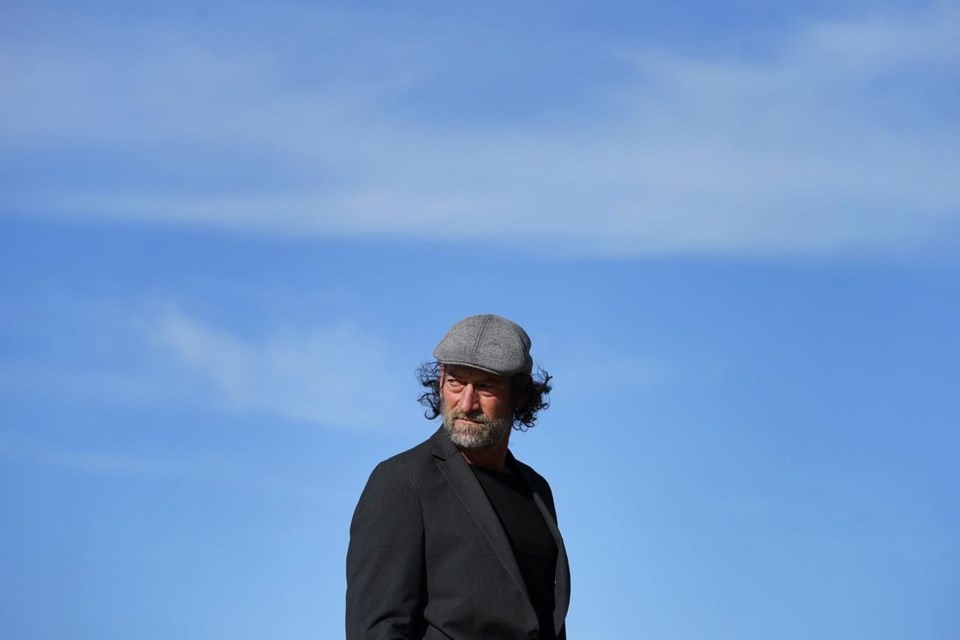NEW YORK (AP) — When Troy Kotsur made history as the first Deaf male actor win an Oscar at the 2022 Academy Awards, he was thinking about his father.
By then, Kotsur had already become a hero to the Deaf community, widely celebrated for his acclaimed performance in the family drama “CODA.” It was easy to admire the tenacity and talent that had brought Kotsur, in his early 50s, to the movies' biggest stage after years of struggle as an actor in an industry not known for its hospitality to Deaf performers.
To Kotsur, his persistence was most owed to one person: His father. At the Oscar podium, Kotsur dedicated the award to him. “You are my hero,” he said.
“He didn’t look at me as having limitations. He continued to push me and push me,” Kotsur said in an interview Thursday through an interpreter. “That’s why I am who I am today.”
In “To My Father,” a short film premiering this week at the Tribeca Film Festival, Kotsur extends and deepens that tribute to explain his father's story and how it shaped him.
Leonard “Len” Kotsur was the police chief of Mesa, Arizona, whose two other sons could hear. Ninety percent of Deaf children are born to hearing parents but the wide majority of those parents never learn American Sign Language. The elder Kotsur wasn't one of them. He was, Troy says, the best signer in the family.
“Most deaf kids have hearing parents who unfortunately do not know sign language at all,” says Kotsur. “So I need to show them that there’s nothing wrong with sign language and there’s nothing wrong with the Deaf person.”
Shortly before Kotsur graduated high school, his father was in a car accident with a drunk driver. He became paralyzed from the neck down and spent the rest of his life in a wheelchair. Crushingly, he could no longer sign as he once did with his son.
“But he didn't let that stop him,” says Kotsur. “About six months after the accident, he went back to work. He continued working as the chief of police, paralyzed in a wheelchair. He didn’t care. He really persisted. And my dad was a great example for me. Me being deaf wasn’t a big deal. I didn’t let that stop me. I kept persisting and, surprisingly, I even won an Oscar.”
The accident altered the perspectives of both father and son. In press reports at the time, Kotsur's father spoke about struggling with depression and the frustration of not being able to communicate the same way with Troy.
“Finally, I saw that there were a lot of people worse off than me,” Leonard Kotsur told the Arizona Republic in 1988. “I still have my head and my shoulders, and I can still talk and do things.”
Kotsur and his father, who died in 2001, developed their own sign language based on the gestures that he could manage. For something more elaborate, his father used a keyboard with a pencil taped to his hand.
“We really had to have the patience to take the time to communicate,” says Kotsur.
A little more than a year after winning his Oscar, that moment has already been usurped by another, more earthshaking one: Kotsur's daughter graduated high school last month. With the prospect of an empty nest with his wife, Deanne Bray, upcoming, Kotsur is looking forward to working more. “And maybe more parties to go to,” he says, smiling.
Kotsur recently signed on to his first role since “CODA,” which also won best picture. He's to star alongside Maika Monroe in the crime thriller “In Cold Light” from director Maxime Giroux.
“There’s been a lot of meetings,” Kotsur says of his life since “CODA.” “I’ve had a lot of meetings and some scripts that were already written but didn’t have a Deaf role. And so we’ve been discussing how we can adapt these roles to have a Deaf person in these projects. We’ve developed a lot of creative projects together, some things that people have probably never thought of, and I’m pretty excited.”
The “CODA” win was a watershed moment for the Deaf community. But change in Hollywood can stagnate after making big leaps forward. “CODA,” Kotsur thinks, has impacted Hollywood. Most of all, he says, it showed Deaf culture in a more authentic and human way.
“And it’s become a domino effect,” says Kotsur. “I’m seeing a lot of doors begin to open for Deaf professionals and more opportunities out there.”
Kotsur, himself, is still getting used to being seen as a trailblazer.
“When I was younger and I was about 12 years old, I met several Deaf professional stage actors and I wasn’t really sure if they were hearing or Deaf,” says Kotsur. “After the show, I went up to them and I said, ‘Hey, are you actually deaf?’ And these actors said, ‘Yeah.’ And I said, ‘Can I become an actor in the future?’ And they said, ‘Yeah, of course you can.’ And now these Deaf children are asking me, ‘Can I act and can I be a filmmaker?’ And I say, ‘Yeah, of course. Of course you can, because I did it. That means you can do it, too.’"
___
Follow AP Film Writer Jake Coyle on Twitter at: http://twitter.com/jakecoyleAP
Jake Coyle, The Associated Press



